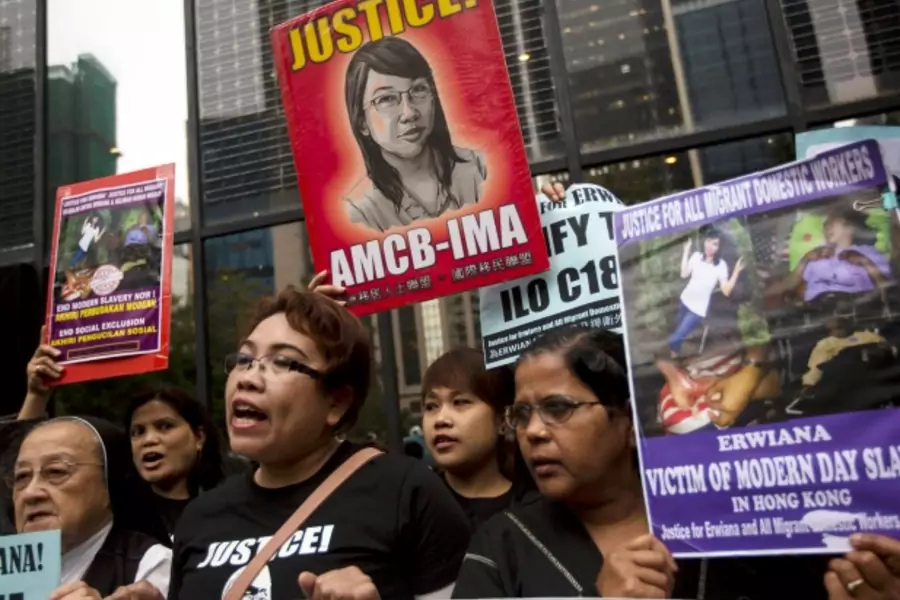Friday Asia Update: Top Five Stories for the Week of February 27, 2015

More on:
Ashlyn Anderson, Lauren Dickey, Darcie Draudt, William Piekos, and Ariella Rotenberg look at the top stories in Asia today.
1. Australian prime minister announces new strategy to confront terrorism threat. Following the release of an official report on the terrorist attack in Sydney in December, Prime Minister Tony Abbott delivered an address at the Australian Federal Police headquarters announcing a new national counterterrorism strategy. A senior official will be appointed to oversee the new measures, which include tightening immigration, curbing the rights of Australians involved in terrorism, strengthening policing powers, and cracking down on hate speech. Abbott asserted that, “on all metrics, the threat to Australia is worsening,” pointing to recent arrests and ongoing serious investigations of terrorist suspects. His remarks provoked criticism from Muslim advocates and leaders who felt that Abbott was stigmatizing the entire Muslim community.
2. Hong Kong woman sentenced for abusing maid. Law Wan-tung, who was convicted of beating, starving, and threatening her Indonesian maid, was sentenced to six years in prison (as well as a small fine of less than US$2,000) for her crimes. The maximum sentence was seven years. In a statement, Erwiana Sulistyaningsih, the abuse victim, stated that she thought the sentence was too light and sends “the wrong signal to employers who mistreat or violate the rights of their domestic workers.” The case has brought to light the difficult conditions for domestic helpers in Hong Kong. As many as 300,000 women, mostly from Indonesia and the Philippines, work in Hong Kong, and are, by law, treated as second-class citizens.
3. Xi unveils his “Four Comprehensives.” Chinese President Xi Jinping revealed his new political theory to the world this week in front-page commentary and headline broadcast throughout state news outlets. The People’s Daily enumerated the Four Comprehensives as such: comprehensively build a moderately prosperous society; comprehensively deepen reform; comprehensively govern the nation according to law; and comprehensively strictly govern the Party. The last comprehensive, on Communist Party discipline, is seen as a reference to Xi’s antigraft efforts, which have been a hallmark of his first years in power. Xi’s slogan follows a long line of political slogans from China’s leaders, from Deng Xiaoping’s “Reform and Opening Up” to Jiang Zemin’s “Three Represents” to Hu Jintao’s “Scientific Outlook on Development.”
4. Anti-corruption court in Bangladesh issues arrest warrants for former prime minister. Begum Khaleda Zia, former prime minister and leader of the Bangladesh National Party (BNP), stands accused of embezzling $650,000 while serving as Bangladesh’s prime minister from 2001 to 2006. Zia has denied the charges, claiming they are politically motivated. The rivalry between Zia and Prime Minister Sheikh Hasina has characterized politics in Bangladesh for the past two decades. In January 2014, Zia called for her supporters to boycott the national elections; Hasina’s Awami League swept to power with more than half of the seats uncontested. Since January, on the one-year anniversary of the national elections described by the BNP as a farce, political protests by BNP supporters have led to more than one hundred deaths. Amid the ongoing violence, a Bangladesh-born American known for his blog about secularism in politics was hacked to death in Dhaka on Thursday.
5. Family of jailed Malaysian opposition leader files for royal pardon. After Malaysia’s highest court upheld a five-year prison sentence for opposition leader Anwar Ibrahim on charges of sodomy earlier this month, the leader is now back in jail. Anwar has maintained the charge against him was politically motivated; his family claims he has been “tyrannized” and his health is at risk the longer he remains behind bars. Despite an initial denial from Anwar’s lawyers, family members are seeking a royal pardon that would allow him to retain his parliamentary seat. The petition for his pardon, however, will carry no weight in the Malaysian government if not signed by Anwar himself.
Bonus: Mummy found inside of a Chinese Buddha statue. CT scans done by researchers at the Netherlands’ Meander Medical Center reveal a detailed view of the preserved remains of a Buddhist monk, estimated to have died in the twelfth century. The mummy is the only one of its kind ever found. The process of self-mummification was considered by some Buddhists to be a form of enlightenment and involves embalming prior to death, rather than posthumously as was done in Egypt.
Correction: The Meander Medical Center is located in the Netherlands, not Norway as originally stated.
More on:
 Online Store
Online Store